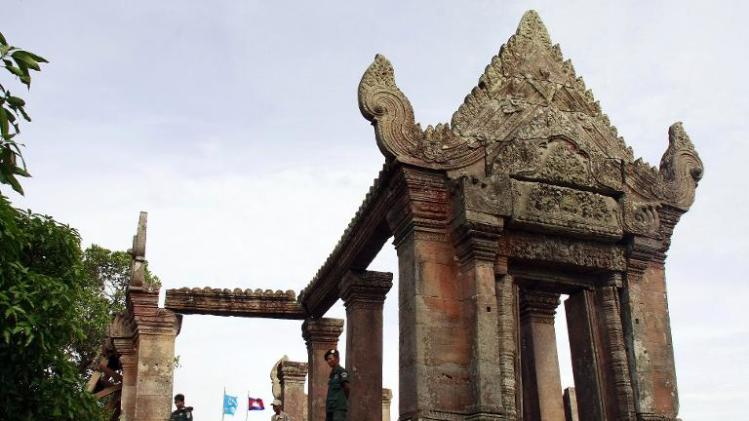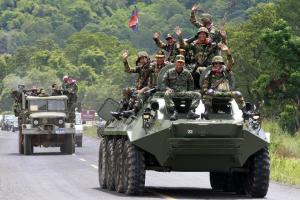UN's top court to rule in Thai-Cambodia temple spat

The Hague (AFP) - The UN's top court will on Monday hand down its verdict in a dispute between Thailand and Cambodia over a flashpoint temple that threatens to reignite nationalist tensions.
The Hague-based International Court of Justice is to rule in the bitter border conflict between the two Asian neighbours, over which at least 28 people were killed in clashes in 2011.
Tens of thousands of people were displaced in the fighting over the patch of land around the 900-year-old Preah Vihear temple, leading Cambodia to ask the ICJ for an interpretation of an original 1962 ruling.
Thailand does not dispute Cambodia's ownership of the temple, a UNESCO World Heritage site, but both sides claim an adjacent 4.6-square-kilometre (1.8-square-mile) patch of land.
Leaders of the two countries have appealed for calm ahead of the ruling by 17 international judges but residents on the border have been building bunkers in anticipation of renewed violence.
Cambodian Prime Minister Hun Sen said Thursday he had spoken with his Thai counterpart Yingluck Shinawatra and the two agreed to accept the verdict and to maintain peace along the border.
"I would like to appeal to all armed forces who are fulfilling their duties protecting the border to remain calm, show restraint and to avoid any activities that could cause tension or clashes," he said on state television.
The verdict poses a particular challenge for the Thai government, which is already grappling with mass street demonstrations over a controversial political amnesty bill.
If the ICJ rules against Thailand, the country's opposition is likely to direct public anger towards the government.
The dispute has touched a raw nerve in Bangkok, with Thai censors briefly banning a documentary film on the issue, saying it could "cause disunity among Thais and jeopardise national security".
Monday's ruling will be broadcast live on Thai national television and Yingluck is scheduled to address the nation shortly afterwards, according to government spokesman Teerat Ratanasevi.
Tensions between the two nations have calmed since mid-2011 when Yingluck, the sister of exiled former premier Thaksin Shinawatra, became Thai prime minister.
Thaksin and Cambodia's Hun Sen are close friends.
Last year, the ICJ ruled that both countries should withdraw forces around the ancient Khmer temple, which is perched on a clifftop in Cambodia but with access much easier from the Thai side.
Access from the Cambodian side was so difficult that in the 1970s it was the last place to fall to the Khmer Rouge regime, and also the communists' last holdout in the 1990s.
Cambodia and Thailand finally pulled hundreds of soldiers from the disputed area in July 2012, replacing them with police and security guards.
But Cambodia told the ICJ earlier this year that Thailand must withdraw its security personnel from the temple so as to respect the 1962 judgement.
Thailand in turn said Phnom Penh's request did not meet ICJ criteria and therefore should be declared inadmissable.
It also wants judges to rule that the 1962 decision did not determine "with binding force" where exactly the boundary between the two countries lay.
The roots of the dispute lie in maps drawn up in 1907 during French colonial disengagement.
Residents in the area said they were nervously preparing in case the ruling sparked renewed fighting.
Phumsarol Wittaya, deputy head of a school in the Thai border province of Si Sa Ket told AFP he and his students were clearing bunkers in front and behind the school in preparation.
On the Cambodian side, Pen Chheng, a soldier based a few kilometres from Preah Vihear, said the situation was normal but the army was on heightened alert.



ไม่มีความคิดเห็น:
แสดงความคิดเห็น